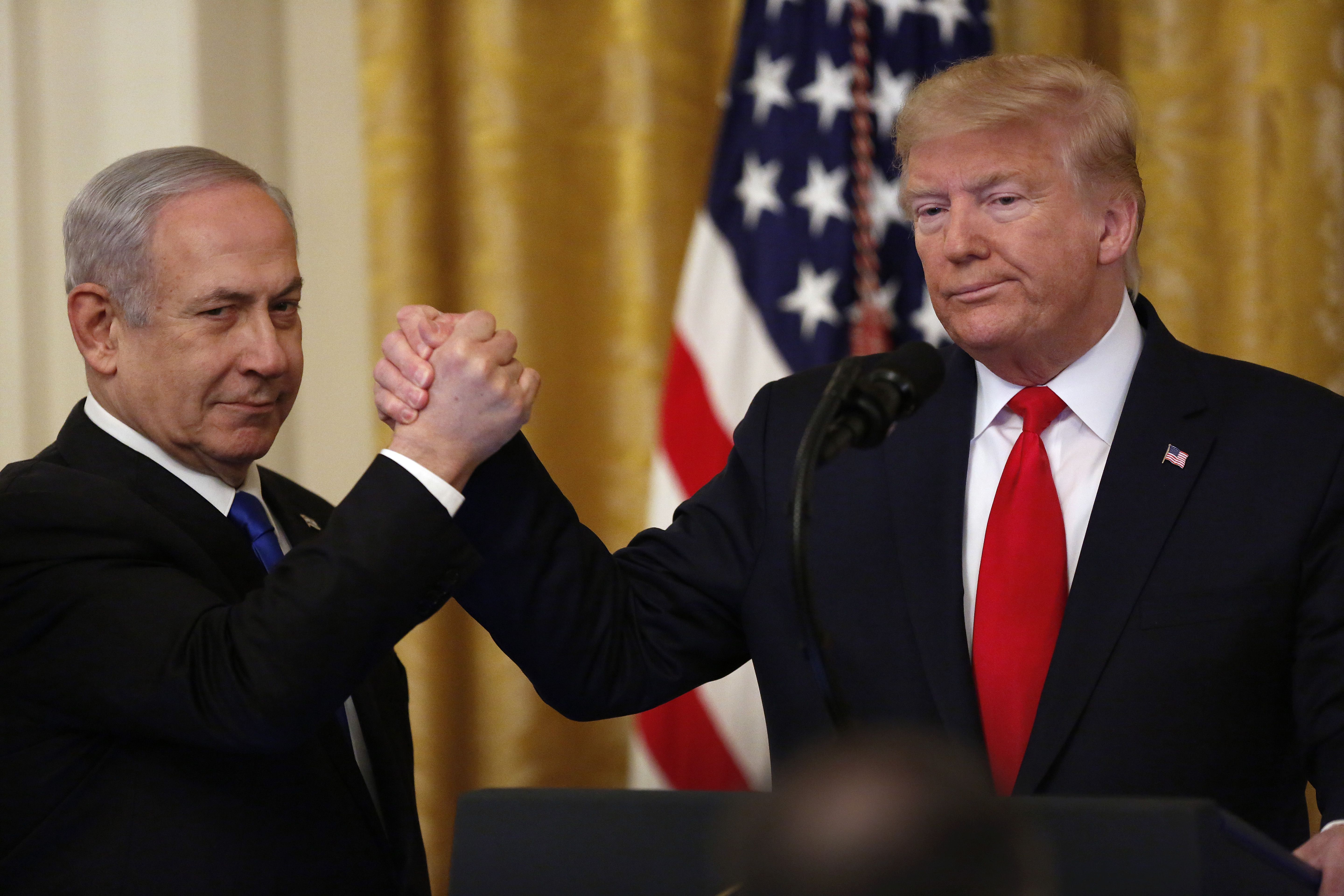The Political Significance of the Trump Israeli-Palestinian Peace Plan

Content and Implementation Scenarios
The plan, called “Peace to Prosperity”, announced on 28 January, is based on adapting the two-state solution but in a clearly pro-Israel framework in all the most important disputed issues (borders, security, the return of Palestinian refugees, the status of Jerusalem). Implementation would mean the creation of a State of Palestine as an entity with limited sovereignty and capabilities as a working state organism. Parts of the West Bank with Jewish settlements and the Jordan Valley (approximately 30% of the area) would become Israeli territory. As compensation, the Palestinians would receive, for example, uninhabited Israeli territory on the Negev. The actual capital of Palestine would not be East Jerusalem but located in adjacent Palestinian municipalities. During the negotiations—planned over a four-year period—the Palestinians would be required to meet a number of political conditions such as not pursuing Israel before international courts. The plan includes provisions already proposed in previous initiatives, such as the tunnel connecting the Gaza Strip and the West Bank or demilitarisation of Palestine. The plan would be complemented by a $50 billion investment package for the new state, announced last June in the economic part of the plan.
The U.S. insists that its plan (which is important for Trump’s evangelical electorate) is a proposal subject to negotiation between the parties, but the asymmetry of its provisions creates prohibitive conditions for Palestinians and makes the scenario of U.S. acceptance of Israeli unilateral actions with regard to the West Bank more probable. Rapid failure of the plan would carry political costs for the president’s re-election campaign. Thus, it is in his administration’s interest to uphold the diplomatic path. For now, the U.S. has blocked Israeli Prime Minister Benjamin Netanyahu from immediately implementing the provisions of Israeli control over the West Bank. The main architects of the U.S. plan—Trump’s advisor and son-in-law Jared Kushner and David Friedman, the U.S. ambassador to Israel—announced that Israel must refrain from “unilateral actions” until the Israeli-American commission works out delimitation of borders for the West Bank. This has forced a suspension of Israel’s actions until at least the Knesset elections planned for 2 March, and for longer if the U.S. deems it necessary.
Israeli Context
The plan’s announcement has had twofold consequences for Netanyahu. On the one hand, it shifted the election campaign gravity away from accusations against him of corruption to the matter of sanctioning Israeli control over the West Bank. In addition, it complicated the situation for the main opposition force, Blue and White, led by Benjamin Gantz. The plan coincides with the party’s proposals. In addition, Gantz’s acceptance of the plan (he met with Trump on the eve of its announcement) sparked conflict with Arab parties, which deprived Gantz of their support, for example, in creating a minority government. On the other hand, the announcement did not change election preferences in Israel. According to polls, neither the bloc that includes the PM’s party, Likud, nor Blue and White will gain a parliamentary majority. There is also little chance that the plan could serve as a basis for building a national unity cabinet. Delaying the immediate annexation of the Jordan Valley and settlements by Netanyahu has caused friction with his political partners on the right and with settlers’ groups that reject any form of Palestinian independence.
Netanyahu announced the annexation of the settlements—his continual election promise—after the 2 March election. If Likud wins in the upcoming vote, this declaration is likely to be implemented, because without it the creation of a coalition with the religious-national camp desired by Netanyahu wouldn’t come about. In turn, a decision taken while head of an interim government (before the formation of the cabinet by the opposition or after the announcement of the next elections) could be contested politically and legally. On the other hand, a government led by Gantz most likely would not proceed with unilateral actions in the West Bank. Annexation would be difficult to undo, with constitutional law requiring annulment to be supported by two-thirds of MPs or a majority of voters in a referendum.
Palestine, the International Community, and the Plan
The Palestinian side—the Fatah-ruled Palestinian Authority (PA) and Hamas—and the overwhelming majority of the population (94% according to polls) reject Trump’s plan. In the PA, there is no political force (among the potential successors of President Mahmoud Abbas as well) that considers it as a basis for peace negotiations. However, the scale of the Palestinian reaction has remained limited. There have been neither mass attacks on Israeli targets nor major protests in either the West Bank or the Gaza Strip. President Abbas has not followed up on his announcement that he would end security cooperation with Israel. At the diplomatic level, consolidation of political support among the international community has become a priority for Palestine. These activities are countered by U.S. diplomacy, for example, it pressured UN Security Council (UNSC) members to not address a draft resolution critical of the plan.
The international reactions mostly followed a similar pattern: praise of the U.S. for proposing a new initiative in the Israeli-Palestinian conflict while criticizing the plan’s provisions. Trump’s plan also highlighted divisions among EU countries. The initiative was condemned by High Representative for the EU Josep Borrell and five European current or former members of the UNSC (and Poland was a non-permanent member in the previous term) rejected its parameters. At the same time, opposition from some countries resulted in blocking the adoption of a statement criticising the plan at the EU level, while several members (e.g., Austria, Hungary) accepted Trump’s plan.
The attitude of Arab states remains varied. In government statements, reactions from some countries (e.g., Egypt) were neutral or favourable in tone. In turn, multilateral forums presented much more criticism of the plan (e.g., the Arab League’s declaration). The positions of regional states are crucial because their support can be used by American diplomacy to pressure both Israel and the PA, in particular.
Conclusions and Perspectives
Trump’s plan does not mean a resumption of the Israeli-Palestinian negotiations. The solutions proposed and the moment of their announcement during election campaigns in both the U.S. and Israel has influenced a cautious tone in the reaction and the adoption of a wait-and-see attitude by most of the interested parties.
In the short term, the future of the plan will be determined by the elections in Israel, and in case of a right-wing victory, the government’s likely decision to annex the settlements. In such a scenario, the Palestinian authorities—in the face of political and social pressure—will not be able to limit counteractions only to diplomatic activities, and relations with Israel will most likely be ceased. At the same time, the scale of the anticipated protests—directed against both Israel and the PA—may lead to destabilisation of the West Bank.
In the long run, the U.S. presidential elections will be a key factor. If Trump is re-elected, it means continuing support for Israel towards the Palestinians regardless of its strategy (annexation of the West Bank or maintaining the status quo). A victory by the Democratic candidate would mean a change in U.S. policy. Trump’s plan was criticized by the major Democratic opponents, including Bernie Sanders, Pete Buttigieg, and Joe Biden. In case a Democrat wins, a right-wing government in Israel might take unilateral action towards the West Bank to conduct future negotiations as fait accompli while risking negative reactions from the new administration.
For the dominant political forces in Israel, the plan will be a permanent reference point. Without deep changes in the Israeli political scene, withdrawal from some positions (e.g., control of the Jordan Valley) is unlikely.
It is in the EU’s interest to develop a clear position in two areas—an alternative and acceptable vision for both parties to resolve the conflict, and an action strategy for the unilateral implementation of Trump’s plan by Israel. This will require the EU to rebuild its internal consensus, the lack of which affects the credibility of any European proposal.





